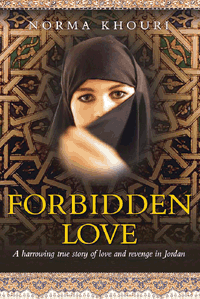Forbidden Love
Forbidden Love is a book labelled a "fake" by the Sydney Morning Herald[1], written under a pen name (Norma Khouri). The book scaled to the top-sellers list in Australia in 2004, it was translated into several languages, and published in 15 countries... The publisher of the book was Random House.
According to the Sydney Morning Herald's literary editor:
- Her tragic story stole readers' hearts and triggered an international outcry. She became a best-selling author in the same league as J.K.Rowling and Michael Moore. She petitioned the United Nations personally, was published in 15 countries, and Australians voted her memoir into their favourite 100 books of all time. But Norma Khouri is a fake, and so is Forbidden Love.
…
Khouri's hoax will take its place in a long Australian tradition of literary fraud, from Ern Malley to Helen Darville-Demidenko. But no other fraudulent book has had such wide sales or impact, and in Darville's case the deception only involved her persona, not her book. Khouri has misled the world both on the page and in person.[2]
Khouri was not the real name of the author, as the Sydney Morning Herald's literary editor noted:
- Khouri's real name is Norma Majid Khouri Michael Al-Bagain Toliopoulos, and she only lived in Jordan until she was three years old. She has a US passport and lived from 1973 until 2000 in Chicago. She is married with two children, 13 and 11. She has four American siblings and a mother who are desperate to hear news from her. But she has managed to conceal this double life from her publishers, her agent, lawyers in several continents, the Australian Department of Immigration and, until now, the public.[3]
Subsequently "Norma Khouri" went on to publish Honor Lost: Love and Death in Modern-Day Jordan (Washington Square Press 2004). Furthermore, Forbidden Love was translated into more languages, and continues to be distributed by the original publisher. As of 25 October 2006 Amazon.com carried both books and several of the translations.
Forbidden Love has been used for propaganda purposes. Here are some instances of quoting the book:
- Phyllis Chesler, The New Anti-Semitism: The Current Crisis and What We Must Do About It, page 174.
- John U. Hanna, Cancer in America: The Enemy Within--The Latent Islamic Invasion Into the New World and Its Adverse Affect on America, page 96.
- Seth Mydans, Amor fatal en el Islam: Norma Khouri relata en un libro el drama y la constante amenaza de muerte a las mujeres musulmanas, Epoca (Magazine/Journal), 28 Feb 2003, Publisher: Thomson Gale.
Contents
Basic Message
Gillian Whitlock writes in the Australian Literary Studies:
- At times like this, everyone becomes a literary critic: All autobiographies contain little lies, but Norma Khouri's may be one of the many that are one big lie. Khouri's best-seller Forbidden Love... had the usual formula for success in a world starving for fashionable victims. It goes like this: trade as a woman, if possible, who is from some tribe or oppressed minority, and has survived the cruelty of whites /colonialists/right-wing thugs/rich guys. And if you aren't any of all of the above, then fake it.[4]
Amir Butler summarises the book as follows:
- Norma Khouri would dupe the world into believing Forbidden Love: her purportedly autobiographical account of her life in Jordan centered around the honour killing of her childhood friend, Dalia. The book, a tragic Romeo and Juliet style tale of love between Muslim hairdresser Dalia and Christian customer Michael ends with Dalia being murdered by her Muslim father incensed at the extra-marital and inter-religious liaisons of his daughter.
The book invokes all the required ingredients demanded by the increasingly over-populated genre of Tales of Oppressed Muslim Women: the religious chauvinism of the Arab Muslim male, the stifling oppressiveness of a Muslim society, the systemic misogyny of the Muslim state and, of course, the primitive tribalism and pride that would drive an ordinarily mild-mannered father to murder his own daughter.[5]
The Bottom line
Amir Butler concludes his analysis of the book with:
- With Muslim-Western relations characterised by mutual misunderstandings and ignorance, such books — whether penned by Muslims or non-Muslims — feed the falsehood that lies at the heart of so many of the problems between our two civilizations. For this reason, the real tragedy is not that Khouri's life and book were elaborate lies; the real tragedy is that so many of us find them so believable.[6]
Publishers of her book
- Bantam (US)
- Random House (Australia)
- Lattès (France)
References, Resources, Publications
Resources
- Carrie Dawson and Maggie Nolan, "Who's who? Mapping hoaxes and imposture in Australian literary history", Australian Literary Studies, 1 October 2004, Publisher: Thomson Gale, Volume: 21 Issue: 4.
- Kathy Marks, Exposed: a literary liar and her phoney love, The Independent, 18 February 2007.
Notes
- ↑ Malcolm Knox, Bestseller's lies exposed, Sydney Morning Herald, 24 July 2004. (best overview)
- ↑ Malcolm Knox, Bestseller's lies exposed, Sydney Morning Herald, 24 July 2004. (best overview)
- ↑ Malcolm Knox, Bestseller's lies exposed, Sydney Morning Herald, 24 July 2004. (best overview)
- ↑ Gillian Whitlock, "Tainted testimony: the Khouri affair", Australian Literary Studies, 1 October 2004, Publisher: Thomson Gale, Volume: 21 Issue: 4 Page: 165(13).
- ↑ Amir Butler, Norma Khouri: Tragic Lies, 26 June 2004.
- ↑ Amir Butler, Norma Khouri: Tragic Lies, 26 June 2004.
